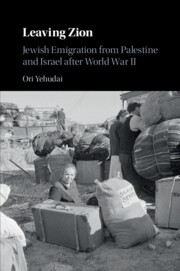Book contents
Conclusion
“Jews with Suitcases”
Published online by Cambridge University Press: 24 April 2020
Summary
In November 1951, a group of 150 Indian Jews, members of the Bene Israel community, left their homes in various parts of Israel and staged a sit-down strike in one of Tel Aviv’s main streets. The group members had immigrated to Israel two years earlier, but now demanded that the Jewish Agency transport them back to India. Shortly before the strike, the immigrants sent a letter to the agency, declaring that after experiencing the “very hard and bitter life” in Israel, they had decided that the only place for them was India. They complained that Jewish Agency emissaries in Bombay had promised to send them to religious settlements in Israel, but instead placed them in secular kibbutzim, thus forcing them to commit the “deadly sin” of eating non-kosher food. The attitude toward them of kibbutz people was “very unfriendly” and included “many incidents of heartlessness and mean behavior.” Others who had settled in the town of Beersheba in the southern Negev region complained about bad jobs, difficult climate conditions, economic hardships, and inappropriate treatment by the authorities. Furthermore, in Bombay they had been told that there was no “color bar” in Israel and that all Jews were being treated equally – “but in a shop in Beersheba we were told that we should eat only black bread as we were black and the white bread was only for white Jews.” The immigrants warned that if their demand to be sent back to India at the Jewish Agency’s expense was not fulfilled within eight days, they would go on a hunger strike: “We shall not use violence as we are peaceful people but we cannot look on any longer as our people grow daily weaker from trials and tribulations.”
- Type
- Chapter
- Information
- Leaving ZionJewish Emigration from Palestine and Israel after World War II, pp. 218 - 239Publisher: Cambridge University PressPrint publication year: 2020

